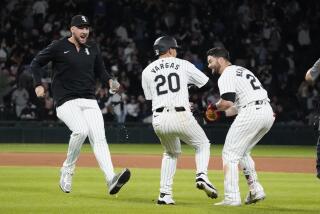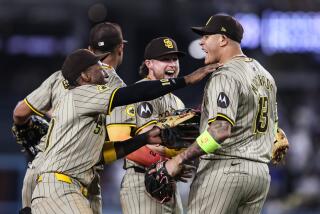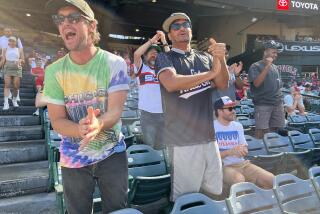Joyner Slide Takes Angels Out of Game in Chicago
- Share via
CHICAGO — Cookie Rojas could have argued his case until the 8,206 fans went home, and many of them were en route while the Angel manager hollered at second-base umpire Jim McKean after Thursday’s final out, but this was a debate crippled by one crucial piece of evidence.
Wally Joyner, the defendant, pleaded guilty.
The Angels wound up 2-1 losers to the Chicago White Sox at Comiskey Park when McKean cited Joyner for runner’s interference while attempting to bust up a game-ending double play. As he slid hard into second base, Joyner hooked White Sox shortstop Ozzie Guillen’s leg with his left arm, and when Guillen was unable to unleash a throw of any kind, McKean gave the thumb to both Joyner and hitter Brian Downing.
A budding Angel rally was over, along with the game. And an invective-filled controversy had just begun.
Rojas contended that Guillen had no play after the force-out--Guillen ended up facing home plate on the play--and argued that Joyner had not intentionally grabbed the shortstop during his slide.
“Guillen was not even looking to throw to first base,” Rojas angrily told reporters. “If a guy gestures toward first base, sure, it’s a double play. But Guillen was only looking to third base.
” . . . He (McKean) said Joyner grabbed him, and that’s interference. Guillen was standing on top of the bag. How the hell can you slide into second base with a guy standing right on the base and not touch him? The rule says that if you grab the guy on purpose, it’s interference. But you tell me: Did Wally do it purposely or was Ozzie Guillen in his way?”
How about it, Wally?
Well, Joyner will tell you that he did it . . . um . . . on purpose.
“I tried to trip him,” Joyner admitted. “I was trying to get in his way so he could not smoothly throw to first base. That’s how you break up a double play, right? Maybe I didn’t do it the right way.”
The confession continued.
“I’m not going to deny that I didn’t try and do it,” Joyner went on. “I hooked him with my elbow and my arm wrapped around him. That’s why (McKean) called it. I’m not denying it was probably the right call.
“Maybe you’re not able to do this,” he added, moving his arm in the hooking motion he had used to clip Guillen. “When you’re sliding, your feet go everywhere and your arms go everywhere. You’re trying to break up a double play.
“My job is to play and to play hard. I don’t know the specifics of every rule.”
It is, however, McKean’s job to know the specifics of every rule. And McKean never hesitated before ruling the play an automatic double play.
“It’s interference,” he said. “You can’t grab the guy’s leg. It doesn’t matter where he’s throwing or even if he doesn’t throw it at all. It’s interference. It had to be obvious to end the game that way, and it was very obvious.”
The setting was laid out in the top of the ninth inning when Tony Armas and Chili Davis knocked Chicago starter Dave LaPoint (1-0) out of the game with consecutive one-out doubles. That cut the White Sox lead to 2-1 and brought on relief pitcher Bill Long to face Joyner.
Long walked Joyner on four pitches.
That brought up Downing, who bounced a 3-2 pitch to second baseman Fred Manrique. Manrique threw the ball to Guillen at second base for the force of Joyner, but by the force of Joyner’s slide, Guillen could only make a pump fake toward third, where Davis was stationed.
McKean interceded, and the Angels, instead of positioning runners on first and third for Devon White, were sent on their way back to Anaheim with a 1-2 record.
The baseball rule book supports McKean. According to Rule 7.09, Paragraph F, it is interference if “any batter or runner who has just been put out hinders or impedes any following play being made on the runner. Such runner shall be declared out for the interference of his teammate.”
Technically, that suggests McKean should have ruled Davis out instead of Downing. Guillen, however, maintained his first intention on the play was to throw to first.
“I was getting ready to throw to first base,” Guillen said. “I think the umpire made a good, clear call. I think (Joyner) was going for my leg. I think he was trying to break up the double play. (McKean) called it right away.”
White Sox Manager Jim Fregosi seconded McKean’s opinion.
“I just saw it on the instant replay and it was an outstanding play by the umpire,” Fregosi said. “You can’t tackle the shortstop. There’s a rule--you can’t tackle the shortstop.”
Clouded amid the dust and confusion was a decent pitching duel between LaPoint and the Angels’ Chuck Finley. LaPoint shut out the Angels on 3 hits through 8 innings--retiring 15 straight batters before Armas’ ninth-inning double--while Finley allowed just 1 earned run and 5 hits in 6 innings.
Chicago’s only earned run came in the fourth inning when Gary Redus singled, stole second and scored on a one-out single by Ivan Calderon. The White Sox added the decisive run in the fifth with an assist from Angel shortstop Dick Schofield. With two outs and Guillen on second base, Schofield committed his first error in the last 44 games, letting Lance Johnson’s grounder skip off his glove, which enabled Guillen to sprint home.
That gave the White Sox a 2-0 lead entering the ninth inning. The doubles by Armas and Davis made it 2-1--and the Angels were in position at least to tie when Downing delivered his chopper toward Manrique.
Knowing a double play would have snuffed that opportunity, Joyner was determined to break it up--by hook or by crook.
McKean cited Joyner for both and ended the Angels’ threat himself. And when Joyner ‘fessed up afterward, all Rojas could do was close his case and head for home.
For Rojas, the truth was not the best defense Thursday afternoon.
Angel Notes
Johnny Ray took himself out of the game after striking out in the first inning because of a strained right rib cage. “It’s something I hurt sliding (Wednesday night),” Ray said. “It’s a little muscle pull, but I didn’t want to end up tearing it. I felt it when I was swinging the bat. If you can’t swing the bat, I don’t think you should be in the lineup.” Ray said there was a chance he would be able to play in tonight’s Angel home opener. “We’ll see how it feels,” he said. “If I can get the soreness out of it, I might be able to play.” . . . Chili Davis was thrown out at home in the fourth inning on a play that loomed large in light of the ninth-inning controversy. Davis was on first base when Wally Joyner doubled to right field and had rounded third when Ivan Calderon’s outfield relay skittered past second baseman Fred Manrique. With the ball loose in the infield, Davis decided to break for home. But third baseman Kenny Williams gloved the ball and made a perfect throw to the plate, where catcher Carlton Fisk made the tag on Davis. “It was a hustle play,” Cookie Rojas said. “It would have been nice to have runners on second and third and nobody out, but I like to see my players hustle. You can always reflect on what a play like that means in the game later, but I’m not going to condemn anyone for hustling. I’m not going to take the aggressiveness out of our hitters.”
Bill Buckner’s game-winning pinch-single in Wednesday night’s game was the 2,599th hit of his career. “I used to dream of getting getting 3,000 hits,” Buckner said. “Now, I’m looking forward to 2,600.” In Buckner’s last 15 regular-season games, he is batting .353 (18 for 51), including three pinch hits. . . . Former Angel Manager Gene Mauch will throw out the first ball before tonight’s home opener.
More to Read
Go beyond the scoreboard
Get the latest on L.A.'s teams in the daily Sports Report newsletter.
You may occasionally receive promotional content from the Los Angeles Times.






